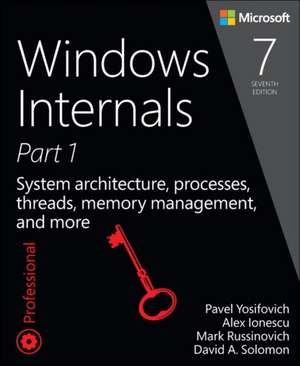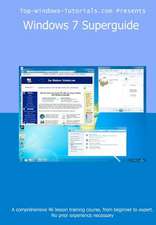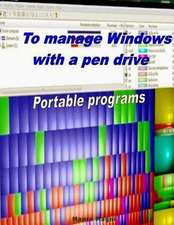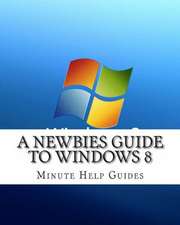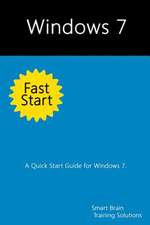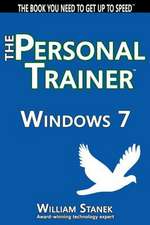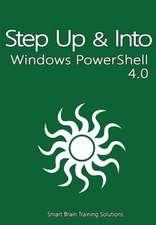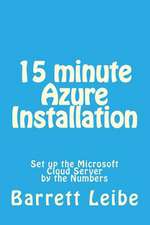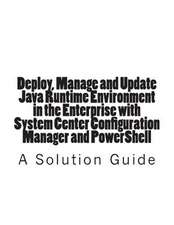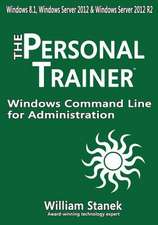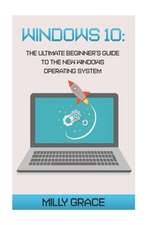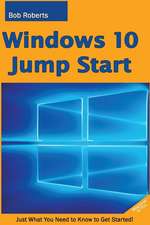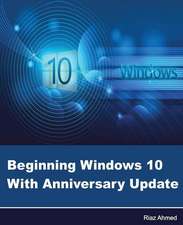Windows® Internals, Book 1: Developer Reference
Autor Brian Catlin, Jamie Hanrahan, Mark E. Russinovich, David Solomon, Alex Ionescuen Limba Engleză Paperback – 30 oct 2014
Preț: 242.53 lei
Preț vechi: 303.16 lei
-20% Nou
46.41€ • 48.28$ • 38.32£
Carte disponibilă
Livrare economică 24 martie-07 aprilie
Livrare express 08-14 martie pentru 62.47 lei
Specificații
ISBN-10: 0735684189
Pagini: 900
Dimensiuni: 187 x 229 x 45 mm
Greutate: 1.29 kg
Ediția:7th edition.
Editura: Microsoft Press
Seria Developer Reference
Notă biografică
Pavel Yosifovich is a developer, trainer, and author specializing in Microsoft technologies and tools. He is a Microsoft MVP and a Pluralsight author, and loves all things software. Pavel has been around since the days of 8-bit machines and still looks back fondly on his programming days on his Commodore 64.
Alex Ionescu is Vice President of EDR Strategy at CrowdStrike and an internationally recognized expert in low-level system software, operating system research and kernel development, security training, and reverse engineering. He teaches Windows Internals courses around the world and is active in the security research community through conference talks and bug bounty programs.
Mark Russinovich is Chief Technology Officer for Microsoft Azure, Microsoft's global enterprise-grade cloud platform. Mark is a widely recognized expert in distributed systems and operating systems. He co-founded Winternals Software and joined Microsoft in 2006 when it was acquired. He is the primary author of the Sysinternals tools and website, which include dozens of popular Windows administration and diagnostic utilities.
David Solomon (retired) taught Windows kernel internals for 20 years to developers and IT professionals worldwide, including at Microsoft. His first book was Windows NT for OpenVMS Professionals. He then authored Inside Windows NT, 2nd edition, and later, with Mark Russinovich, coauthored the 3rd, 4th, 5th, and 6th editions of the Windows Internals series. David has spoken at many Microsoft conferences and was a recipient of the 1993 and 2005 Microsoft Support Most Valuable Professional (MVP) award.
Cuprins
Chapter 1: Concepts and tools
Windows operating system versions
Foundation concepts and terms
Digging into Windows internals
Conclusion
Chapter 2: System architecture
Requirements and design goals
Operating system model
Architecture overview
Virtualization-based security architecture overview
Key system components
Conclusion
Chapter 3: Processes and jobs
Creating a process
Process internals
Protected processes
Minimal and Pico processes
Trustlets (secure processes)
Flow of CreateProcess
Terminating a process
Image loader
Jobs
Conclusion
Chapter 4: Threads
Creating threads
Thread internals
Examining thread activity
Thread scheduling
Group-based scheduling
Worker factories (thread pools)
Conclusion
Chapter 5: Memory management
Introduction to the memory manager
Services provided by the memory manager
Kernel-mode heaps (system memory pools)
Heap manager
Virtual address space layouts
Address translation
Page fault handling
Stacks
Virtual address descriptors
NUMA
Section objects
Working sets
Page frame number database
Physical memory limits
Memory compression
Memory partitions
Memory combining
Memory enclaves
Proactive memory management (SuperFetch)
Conclusion
Chapter 6: I/O system
I/O system components
Interrupt Request Levels and Deferred Procedure Calls
Device drivers
I/O processing
Driver Verifier
The Plug and Play manager
General driver loading and installation
The Windows Driver Foundation
The power manager
Conclusion
Chapter 7: Security
Security ratings
Security system components
Virtualization-based security
Protecting objects
The AuthZ API
Account rights and privileges
Access tokens of processes and threads
Security auditing
AppContainers
Logon
User Account Control and virtualization
Exploit mitigations
Application Identification
AppLocker
Software Restriction Policies
Kernel Patch Protection
PatchGuard
HyperGuard
Conclusion
